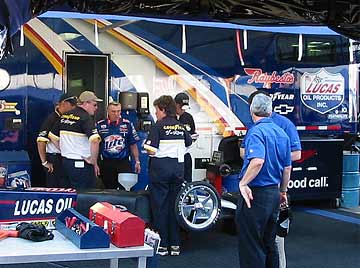|


The chunked tire
caused a conference in the Prudhomme
team’s pit area. |
During first round qualifying Sunday at Indy
Don Prudhomme’s Miller Lite Top Fuel
dragster driven by Larry Dixon lost almost
the entire outside edge of one slick and chunked
a portion of the left front tire. There
was enough concern over this incident that
crew chief Dick LaHaie led NHRA’s director
of Top Fuel & Funny Car racing, Ray Alley,
through the damage to the tires. Soon afterward
NHRA’s Don Taylor (Senior Director of
National Technical Operations) and Cary Menard
(VP - Technical Administration & Legal
Affairs) arrived in the Snake’s pit about
the same time as four Goodyear tech people
who gather and record data after each occurrence
of tire chunking.
When asked about his tires chunking at Indy,
two-time Top Fuel champ Dixon responded, “It’s
an issue they are working real hard on and
they are trying to fix it. I can’t give
you an expert opinion about how to construct
a tire or how to build a racecar or a Chevy
van. You would be better suited to ask Goodyear
to answer any questions, ‘cause I don’t
have an answer for you; that isn’t my
department. If you want to take a poll out
here on who’s chunking tires, we chunked
a front one...”
But this is a problem Dixon has had for some
time. “Before I entered my first national
event race I lost a tire at Bakersfield, so
this isn’t something that’s new
to me.” That incident happened in 1995
and Dixon crashed the Top Fuel car because
the tire exploded.
“I have had four crashes in my career
and three were because of the tire,” Dixon
continued. “Goodyear looked into all
three incidents and came to the decision that
debris on the racetrack caused the tire to
blow.”
Knowing that there is a serious problem with
the tire, we spoke with Goodyear’s Carolyn
Ashbee, Sales & Marketing Manager for the
Racing Division and Goodyear Chief Engineer
for Race Tires David Auffenberg. The
first thing they told us was that the Goodyear
tire company does not derive a profit from
the sales of drag racing slicks.
Ashbee said, “It’s not a money-making
proposition. We are in it to build an image,
build our technology base and then market that
to sell passenger tires.”
Tire engineer Auffenberg added, “There’s
a lot to be said about what we (Goodyear) do
out here; looking at new compounds, new construction,
new mold shapes...we can do all that in a very
quick turnaround and develop the technology
very quickly. For passenger tire development,
it may take months; here we can do things within
days and weeks. There’s a lot of technology
transfer that goes on here that we can pass
along to the tire that your average consumer
buys.”
Some Top Fuel teams aren’t chunking
tires, however, including the teams owned by
Doug Herbert and the Carrier brothers. We questioned
Auffenberg about that and he said, “That’s
part of the information we are gathering. We
look at tire temperatures, tire pressures.
There’s a lot of communications with
crew chiefs as to what they are doing for those
particular runs. What are they seeing, what
is the data they are gathering, trying to figure
out the different circumstances that the tire
goes under... different track conditions, different
car set-ups and all those play a role into
why certain people are more prone to a problem
and some people aren’t. It’s not
a universal issue, it tends to be isolated
to certain teams at certain track conditions.”
When asked if there was good communication
among team owners, drivers, NHRA, nitro crew
chiefs and Goodyear, Auffenberg responded, “There’s
a fair amount, but I think we’d always
like it to be more and I think with the state
of where things are now there is a lot more
communication because we are trying to advance
the sport and make sure that the safety is
the most paramount thing for everyone involved.”
However both Auffenberg and Ashbee acknowledged
there is no sharing of technological or safety
advances between the major drag racing tire
suppliers: Goodyear, Hoosier, M&H Racemaster,
and Mickey Thompson racing tires.

|